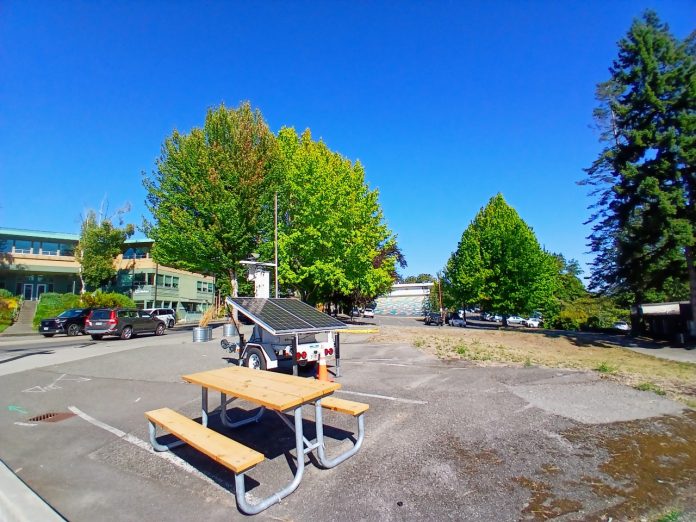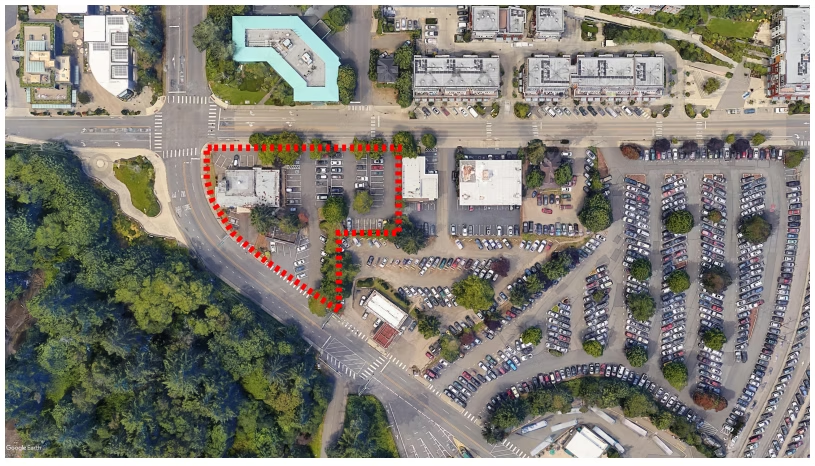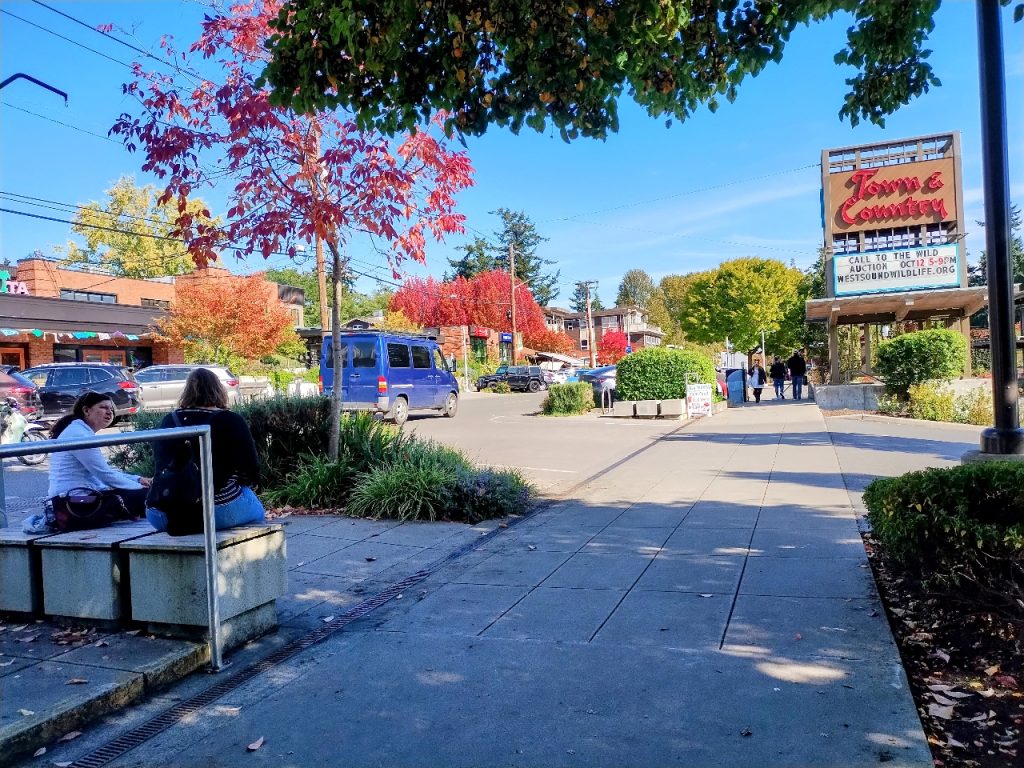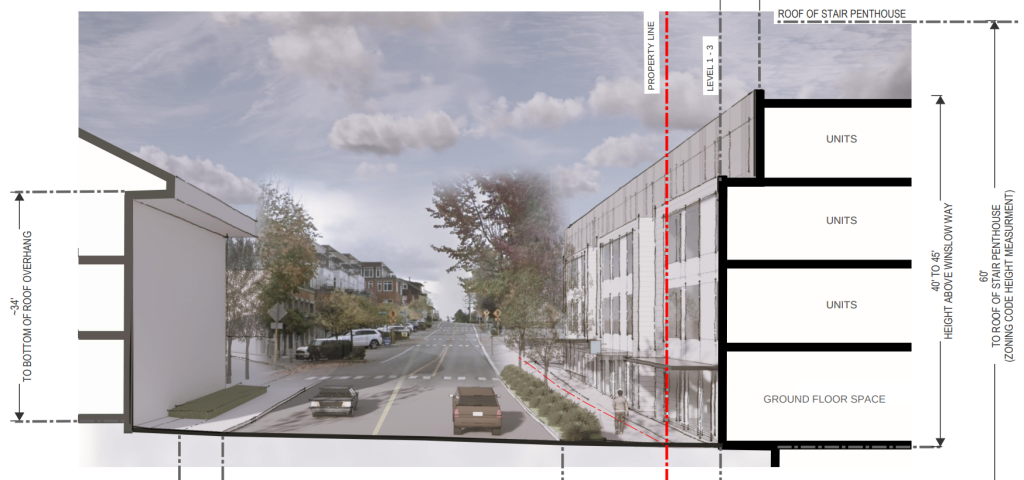
The fate of a long-planned affordable housing project in Bainbridge Island steps from the state ferry terminal remains in limbo this month due an environmental appeal from opponents. That appeal caused the cancellation of a planned public hearing that was the next step in allowing the project to move forward.
The building planned at 625 Winslow Way would add 92 units of workforce housing to Bainbridge’s front door. But it has met considerable opposition from Island residents in recent months who have pushed back on the idea of building subsidized housing in such a prominent location.
The delay means the building’s developer, the Low Income Housing Institute (LIHI), will likely be less competitive for this year’s tranche of state affordable housing funds. But so far LIHI has not signaled any intent to back off on moving the project forward.
Building four stories of affordable housing in Bainbridge’s “Ferry District” is likely to be allowed by-right after the city adopts an updated Comprehensive Plan and associated development regulations, but that work is months behind schedule as the city’s planning commission works through the plan’s minutiae — with over 25 separate meetings so far this year alone on the topic.
To advance the 625 Winslow Way project in the face of that delay, the council was set to consider an ordinance granting additional zoning capacity only to affordable housing projects within the general vicinity of the ferry terminal, east of State Route 305. But in late September, Bainbridge resident Dawn Janow filed an appeal of that ordinance’s validity under the State Environmental Policy Act (SEPA). Janow had just finished third in a three-way race for the open council seat currently held by retiring Councilmember Jon Quitslund in the August primary election, on a platform of “limiting upzoning” throughout the Island’s main business district of Winslow.

Bainbridge Island’s Planning Commission had already signed off on the zoning ordinance, via a 4-2 vote at the end of a marathon, 7.5-hour meeting in early September. And the city had already completed a 4,000-page environmental site assessment for the site last year, with LIHI still due to complete another environmental analysis as part of receiving their project permits. But Janow’s appeal means a detour to the city’s Hearing Examiner that could take weeks if not months to resolve.
In an interview conducted in August, well before the appeal was filed, Janow told The Urbanist that she thought a project like 625 Winslow was too big for a city of Bainbridge Island’s size, and that the city should be focused on smaller-scale affordable housing projects.
“When we take a look at a project like this, that the city is donating $3 million to, and they spent a million to purchase this property. We don’t know what it’s going to cost long-term in terms of water, sewer, any studies that need to be done to get the thing built, the whole story, and then we’re going to build this 90-unit or 100-unit place, and we really don’t have the services to meet the needs of those folks at that very low income bracket. And we do have a housing resources board that’s actually moving along quite well, putting smaller, affordable housing units on the island,” Janow said.
Unlike other LIHI buildings aimed at providing homes for folks directly exiting homelessness with very little income, the Winslow project is aimed at households making 50 to 60% of Kitsap County’s median income, or around $60,000 per year or less, with some residents earning up to 80%. The goal is to provide homes close to Winslow businesses and transit for the city’s rank-and-file workers, who have been increasingly priced out of Bainbridge over the past few decades.

Under a new state law that requires cities to plan for future housing growth by expected income level, Bainbridge needs to accommodate 272 new households in that income range though 2044, along with 867 households earning less — a mandate the city is still grappling with. But Janow, a member of the Bainbridge Island Metro Park and Recreation District board, said that she wanted affordable housing projects to be better integrated into neighborhoods.
“What we’ve been able to do is gradually integrate these low income and affordable housing and mixed income [projects] — I’m very much interested in that — into neighborhoods, and so it’s a little bit less also destigmatizing, but it’s taken off in manageable chunks, which really then gets an opportunity for our services to get up to speed, and it gives an opportunity for people to be integrated into the community in a really sort of natural and consistent way, versus, like, boom, one and done,” Janow said.

While the Bainbridge Island city council had signaled a desire to scale back the 625 Winslow project to around 70 units, a move that would likely have limited the building’s height, the ordinance approved by the planning commission last month included enough development capacity for the full 92 units. The idea of advancing a smaller building here didn’t seem to placate many opponents, with a sizable contingent of city residents still looking to “Save the Corner” for a different type of civic use, and project proponents still wanting to see the full building move forward to provide the maximum amount of affordable housing.
Ultimately, final approval will be up to the city council, after the appeal is dealt with.
“As the developer for this housing community, we are hopeful for a positive outcome with the Hearing Examiner, and don’t anticipate it slowing the process down in any meaningful way,” Jon Grant, LIHI’s Chief Strategy Officer, told The Urbanist.
A hearing on Janow’s appeal has not yet been scheduled.
Ryan Packer has been writing for The Urbanist since 2015, and currently reports full-time as Contributing Editor. Their beats are transportation, land use, public space, traffic safety, and obscure community meetings. Packer has also reported for other regional outlets including BikePortland, Seattle Met, and PubliCola. They live in the Capitol Hill neighborhood of Seattle.

